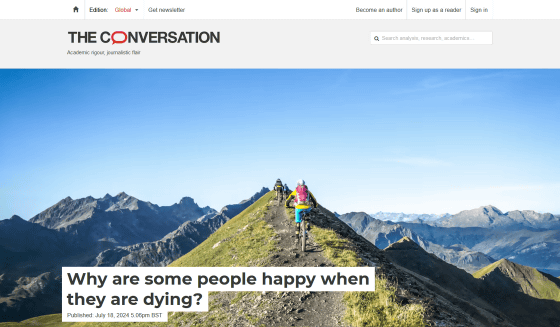Why do some people feel happy when facing death?

Although death is generally considered a frightening thing, some people have reported feeling happy when they are about to die. Matthias Tranberg, a postdoctoral researcher at the Institute of Palliative Care at
Why are some people happy when they are dying?
https://theconversation.com/why-are-some-people-happy-when-they-are-dying-234309

Simon Boaz, an aid worker who died on July 15, 2024 at the age of 47, was diagnosed with terminal laryngeal cancer in September 2023 and faced his own death. In an interview with Boaz published by the BBC on July 4, 2024, Boaz told the reporter, 'My pain is under control and I'm very happy. It may sound strange, but I'm happier than I've ever been in my life.'
In an interview, Boaz said his terminal cancer diagnosis helped him accept that death is an inevitable part of life and helped him to enjoy life more and prioritize it, and that he hopes his cheerful attitude at the end of his life will help his surviving wife and parents.
It may seem strange to feel happy when death is approaching, but in Tranberg's experience as a clinical psychologist who works with people who are close to death, it is not uncommon for people to say they are happy when they are near death. A 2017 study also reported that blogs written by people who are near death use more positive words to describe their experiences compared to a control group of people who write blogs imagining death. 'This suggests that the experience of 'dying' is more joyful, or at least less unpleasant, than we imagine,' Tranberg said.

Themes common to both studies included 'having social connections,' 'enjoying simple pleasures like being in nature,' and 'having a positive attitude.' There was also a tendency for the focus to shift from 'seeking pleasure' to 'finding meaning and fulfillment' as the disease progressed.
In fact, Tranberg worked with a man named 'Johan' who, despite being near death, maintained clear conversations about life, relationships, and his interests. Even though he was no longer able to use his legs, he still had positive goals, such as 'I want to cycle around Mont Blanc .'
Eventually, Johann was unable to even hold crutches, but he still enjoyed life by watching videos of cycling on Mont Blanc with his friends on YouTube and buying and decorating expensive mountain bikes. In addition, he said, 'If I miraculously survive, I would like to volunteer for a home care service for one or two shifts a week. They work so hard and make incredible contributions. Without them, I would not have been able to leave my apartment.' He never forgot his feelings of gratitude and hope.

'In my experience working with patients with life-threatening illnesses, it's possible to feel sadness and happiness at the same time, or seemingly contradictory emotions,' said Tranberg. 'In the same day, patients may feel gratitude, remorse, longing, anger, guilt, and relief, all at once. Facing the limitations of existence broadens perspective and allows them to appreciate life more than ever before.'
Related Posts:
in Note, Posted by log1h_ik







